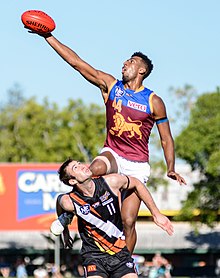
Back Australiese voetbal Afrikaans የአውስትራሊያ እግር ኳስ Amharic Australisc fōtþōðer ANG كرة القدم الأسترالية Arabic كورة القدم الاستراليه ARZ Fútbol australianu AST Avstraliya futbolu Azerbaijani Австралия футболы Bashkir Австралийски футбол Bulgarian অস্ট্রেলীয় রুলস ফুটবল Bengali/Bangla
 | |
| Highest governing body | AFL Commission |
|---|---|
| Nicknames | Australian football, Aussie rules, football, footy, AFL |
| First played | 15 June 1859 in Melbourne, Victoria, Australia |
| Registered players | 1,404,176 (2016)[1] |
| Clubs | 25,770 (2016)[1] |
| Characteristics | |
| Contact | Full |
| Team members | 22 (18 onfield, 4 interchange) |
| Mixed-sex | Up to age 14 |
| Type | Outdoor |
| Equipment | Football |
| Glossary | Glossary of Australian rules football |
| Presence | |
| Country or region | Australia |
| Olympic | Demonstration sport, 1956 Melbourne Olympics |
Australian rules football, also called Australian football or Aussie rules,[2] or more simply football or footy, is a contact sport played between two teams of 18 players on an oval field, often a modified cricket ground. Points are scored by kicking the oval ball between the central goal posts (worth six points), or between a central and outer post (worth one point, otherwise known as a "behind").
During general play, players may position themselves anywhere on the field and use any part of their bodies to move the ball. The primary methods are kicking, handballing and running with the ball. There are rules on how the ball can be handled; for example, players running with the ball must intermittently bounce or touch it on the ground. Throwing the ball is not allowed, and players must not get caught holding the ball. A distinctive feature of the game is the mark, where players anywhere on the field who catch the ball from a kick (with specific conditions) are awarded unimpeded possession.[3] Possession of the ball is in dispute at all times except when a free kick or mark is paid. Players can tackle using their hands or use their whole body to obstruct opponents. Dangerous physical contact (such as pushing an opponent in the back), interference when marking, and deliberately slowing the play are discouraged with free kicks, distance penalties, or suspension for a certain number of matches depending on the severity of the infringement. The game features frequent physical contests, spectacular marking, fast movement of both players and the ball, and high scoring.
The sport's origins can be traced to football matches played in Melbourne, Victoria, in 1858, inspired by English public school football games. Seeking to develop a game more suited to adults and Australian conditions, the Melbourne Football Club published the first laws of Australian football in May 1859.[4][5]
Australian football has the highest spectator attendance and television viewership of all sports in Australia,[6][7] while the Australian Football League (AFL), the sport's only fully professional competition, is the nation's wealthiest sporting body.[8] The AFL Grand Final, held annually at the Melbourne Cricket Ground, is the second-highest-attended club championship event in the world. The sport is also played at amateur level in many countries and in several variations. Its rules are governed by the AFL Commission with the advice of the AFL's Laws of the Game Committee.
- ^ a b Collins, Ben (22 November 2016). "Women's football explosion results in record participation" Archived 22 November 2016 at the Wayback Machine, AFL. Retrieved 22 November 2016.
- ^ "About the AFL: Australian Football (Official title of the code)". Australian Football League. Archived from the original on 3 December 2013. Retrieved 20 June 2017.
- ^ 2012 Laws of the game Archived 22 May 2012 at the Wayback Machine Section 14, page 45
- ^ History Archived 13 December 2007 at the Wayback Machine Official Website of the Australian Football League
- ^ Wendy Lewis; Simon Balderstone; John Bowan (2006). Events That Shaped Australia. New Holland. p. 61. ISBN 978-1-74110-492-9.
- ^ Kwek, Glenda (26 March 2013). "AFL leaves other codes in the dust" Archived 6 November 2016 at the Wayback Machine, The Sydney Morning Herald. Retrieved 18 December 2016.
- ^ "AFL is clearly Australia's most watched Football Code, while V8 Supercars have the local edge over Formula 1" Archived 6 August 2020 at the Wayback Machine (14 March 2014), Roy Morgan. Retrieved 18 December 2016.
- ^ "The richest codes in world sport: Forget the medals, these sports are chasing the gold" (8 May 2014). Courier Mail. Retrieved 9 October 2016.
© MMXXIII Rich X Search. We shall prevail. All rights reserved. Rich X Search